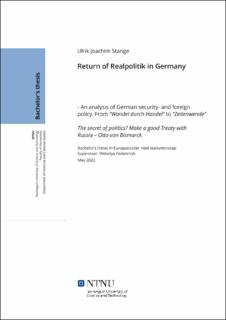| dc.contributor.advisor | Fedorchak, Viktoriya | |
| dc.contributor.author | Stange, Ulrik Joachim | |
| dc.date.accessioned | 2022-07-10T17:19:41Z | |
| dc.date.available | 2022-07-10T17:19:41Z | |
| dc.date.issued | 2022 | |
| dc.identifier | no.ntnu:inspera:110337431:46746931 | |
| dc.identifier.uri | https://hdl.handle.net/11250/3004471 | |
| dc.description.abstract | Etter den russiske annekteringen av Krim i 2014 og invasjonen av Ukraina i 2022, ser vi et skifte i tysk sikkerhets- og utenrikspolitikk. Ved å bruke strukturell realisme og Kenneth Waltz’ tre analysenivåer søker denne oppgaven å forklare det tyske skiftet, og utfordringene som tyske beslutningstakere står overfor. Oppgaven har et innledende kapittel som gir en oversikt over dagens situasjon og denne oppgavens relevans, samt en fremstilling av oppgavens problemstilling. Det andre kapittelet dekker den eksisterende litteraturen om tysk forsvars- og sikkerhetspolitikk og er begrenset i mangelen på aktuelle kilder. Det tredje kapittelet dekker realismens og realpolitikkens teoretiske og konseptuelle rammeverk. Det fjerde kapittelet dekker metoden, og begrensningene ved denne casestudien. Analysen er basert på eksisterende data på det tyske forsvaret, gassimport fra Russland, samt aktuelle uttalelser fra tyske beslutningstakere. Funnene konkluderer med at Tyskland, til tross for sin historie og utfordringer i de væpnede styrkene, har endret politikk etter den russiske invasjonen av Ukraina i 2022. Den tyske hæren vil bli styrket, og importen av russisk energi vil bli redusert. Samtidens utenrikspolitiske situasjon endrer seg for hver dag, men oppgaven argumenterer for at det er et mønster i den aktuelle tysk politikken som kan forklares gjennom realisme og begrepet Realpolitikk | |
| dc.description.abstract | Following the Russian annexation of the Crimea in 2014 and the invasion of Ukraine in 2022, we see a shift in German security- and foreign policy. By using structural realism and three levels of analysis, this thesis seeks to explain the German shift, and the challenges that German decision makers are facing. The thesis has an introductory chapter that gives an overview of the current situation and the relevance of this thesis, as well as a presentation of the research question. The second chapter covers the existing literature on German security and defence policy and is limited by obvious missing in contemporary sources. The third chapter covers the theoretical and conceptual framework of realism and Realpolitik. The fourth chapter covers the methodological approach, and the limitations of this case study. The analysis is based on existing data on German defence, gas imports from Russia, as well as contemporary statements by German decision makers. The findings conclude that Germany, despite its history and challenges in the Armed forces, has shifted in polices following the Russian invasion of Ukraine in 2022. The German armed forces will increase its capabilities, and the imports of Russian energy will decrease. The contemporary situation is changing by each day, but the pattern in contemporary German politics is still clear that there is a shift that can be explained through realism and the term Realpolitik. | |
| dc.language | eng | |
| dc.publisher | NTNU | |
| dc.title | Return of Realpolitik in Germany
- An analysis of German security- and foreign policy. From “Wandel durch Handel” to “Zeitenwende”
The secret of politics? Make a good Treaty with Russia – Otto von Bismarck | |
| dc.type | Bachelor thesis | |
